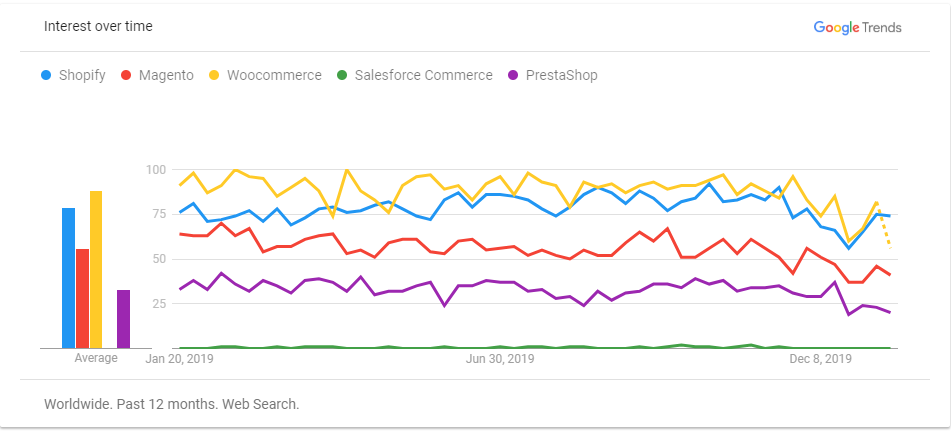We’ve reviewed the 10 best E-commerce platforms available on the market to help you figure out which E-commerce solution is the best fit for your business in 2020.
Build vs. Buy E-commerce Solutions
While building an E-commerce business, it is relatively typical to evaluate build vs. buy options. The build options tend to lean towards home-grown solutions, and buy options favors towards SaaS licensed options.
Of the 1000 largest e-commerce retailers in the industry, about 52% have built their e-commerce systems. Even with the challenges of keeping these systems current with the rapid technology changes, there have been minimal migration efforts to a brand new system. There are a significant cost, complexity, and team scale needed to migrate to the SaaS alternatives.
Build vs. Buy choices for e-commerce may usually center on technology comparisons, but there are many nuances to be considered beyond technology and features.
Build vs. Buy choices for e-commerce may usually center on technology comparisons, but there are many nuances to be considered beyond technology and features.
Buy: Consider buying a licensed or hosted e-commerce solution when your company:
- Has limited resources and lacks internal technical means required to build, deploy, operate, and manage an e-commerce system.
- Requires a quick product launch and does not have time to carry out extensive project planning and development activities.
- Wants to use its technical team for activities that align with the organization’s market-vision and do not wish to undertake the task of managing E-commerce systems.
Build: Consider building an e-commerce solution when your company:
- Has a competitive advantage in creating a unique e-commerce system.
- Operates in a highly-regulated environment, and there is risk involved with using third-party software for e-commerce type of transactions.
- Can address market requirements only with a complex custom-built application
- Has made a substantial investment in e-commerce early on, and now finds converting to a licensed or hosted solution too costly or too disruptive to their business;
- Has commercial advantage building solutions versus buying it commercially.
10 Best E-Commerce platform comparison
Current trends in the e-commerce market show a very competitive market between Shopify, Woocommerce, Magento, and Prestashop. The other platforms, like Salesforce Commerce, are lower on trends but are meant for small enterprise to big ones in the e-commerce market segment.
1. Shopify
2. Shopify Plus
3. BigCommerce
4. Magento
5. WooCommerce
6. Squarespace
7. Wix.com
8. Big Cartel
9. Salesforce Commerce Cloud
10. Prestashop
Closing Thoughts
After looking at the 10 best e-commerce platforms, we see that there’s no single e-commerce solution that fits all online store needs. Consider your business’s needs, sales volume, and potential future growth when picking an e-commerce platform. We hope the list above helps you make the best decision for your business.
Read the full and Detailed Comparisons of all the platforms here:

Comments
Post a Comment